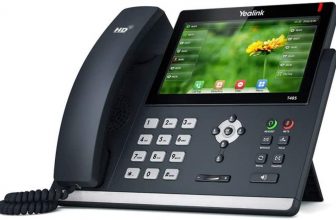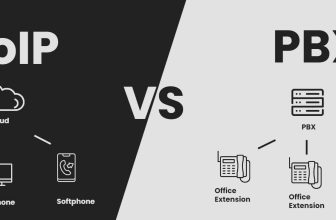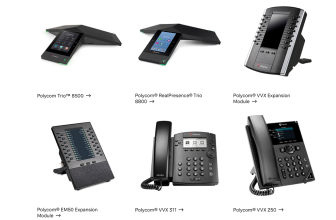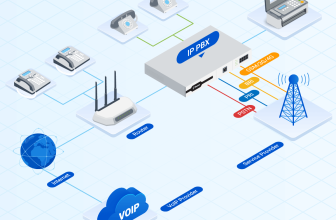Question: What Is a PBX System?
Common Asked Question
If you are looking for the best phone system solutions for your business, then you might have heard about a PBX system. A PBX is a private branch exchange. There are both traditional and IP PBX systems available, so you might be wondering which is best for your business.
If you are wondering about the best business phone for small business, you might be interested in a virtual phone system. Learn more about how a PBX system works and how to get a virtual phone system for your business.
What Is a PBX System?
As mentioned above, a PBX system is a private branch exchange. This is a system that establishes a private telephone network for a small business, allowing its users to talk to one another. Furthermore, a private branch exchange can handle not only internal calls but external calls as well. There are multiple components that need to work together to provide reliable connectivity throughout the business.
There are multiple types of PBX systems available. For example, one of the most popular is a traditional PBX system. This uses standard copper phone lines to provide phone services for businesses. The other option is an IP PBX, which is a private branch exchange that uses the internet. There are some companies that host the networks and servers for this advanced system on-site, while other businesses might decide to go with a cloud-based system, purchasing a subscription to use space on networks and servers hosted off-site.
What Are the Components and Features?
Next, you might be wondering about the components and features of a PBX system. Of course, the components are going to vary depending on the type of PBX system you use.
A traditional PBX system includes a variety of parts, including:
- There must be a cabinet that houses the internal parts.
- There should also be a switchboard manned by operators who can route incoming and outgoing calls to the right place.
- There should be controllers and computers that process the data reliably.
- A traditional PBS also has trunks or lines that connect the system to the telephone company.
An IP PBX has a number of parts as well, including:
- There should be servers that can collect information related to the phone calls and process it reliably.
- There must also be computers that act as gateways or gatekeepers that accept and route data packets reliably.
- There will also be routers that can ensure the internet connection remains active to handle calls appropriately.
- An IT team might also be required to perform maintenance on these components that they are on-site.
Furthermore, a PBX system provides you with access to a variety of features that can help you meet the needs of your employees, customers, and clients. For example, some of the most popular features of a PBX system include:
- Advanced call management, including call blocking features
- Call forwarding, which gives users the option to forward all incoming calls to another number automatically
- Call waiting, which is also called queueing, which allows companies to establish a waitlist for incoming calls
- Call logging, which allows businesses to keep track of all the calls that come in and out
- Voicemail, which might also collect messages if calls cannot be received when the phone lines or internet are out
- Videoconferencing, which is helpful for companies that need to conduct video calls
Importantly, some of these features are only going to be available on a VoIP phone system. It is important to clarify which features are available before deciding which plan to choose.
What Are the Pros and Cons?
Next, you might be interested in the pros and cons as well. Importantly, the benefits and drawbacks are going to vary depending on the type of PBX system you choose.
Some of the biggest benefits of using a PBX system include:
- You can consolidate all of your phone calls, lines, and numbers in one place.
- You have control of the customizable features and tools you select for your business.
- Because you have so many options available, you are in control of your expenses.
- You decide how much you want to spend and how you want to spend it.
- You can also decide whether you want to host a PBX system on-site or purchase space on a network or server hosted on the cloud.
Some of the drawbacks you might encounter include:
- If you decide to go with a traditional PBX system, you might have a lot of expensive equipment that you need to manage.
- If you decide to go with an IP PBX, your phone system might go down if there is an internet outage.
- If you choose a traditional system, you might have a difficult time adding new phone numbers or lines for new employees.
- If you choose an internet-based system, you might have sound quality issues if you do not have enough bandwidth.
A professional can help you navigate these benefits and drawbacks, making sure you select the best possible PBX for your company.
What Are the Differences Between PBX and VoIP Services?
There is a lot of confusion surrounding PBX and VoIP systems. Even though there is a lot of overlap between these services, they are not identical. For example, a traditional PBX system is not the same as VoIP. With a traditional PBX, you use physical phone lines to handle your phone calls. With a VoIP system, you use the internet to handle your phone calls.
On the other hand, you can wrap VoIP components into your PBX system. For example, you might be interested in using a cloud or hosted PBX solution. These systems use the internet to handle their phone calls, so you use VoIP services. You can scale your plan up or back as needed, adding and removing phone lines depending on the needs of your company. Therefore, even though PBX and VoIP are not identical, their features do overlap considerably.
How Do You Get a Virtual Phone Line?
So, if you are interested in a virtual phone system for your company, what do you need to do? Some of the steps you need to follow include:
- You need to take a look at your company and figure out what your needs are. How many users do you have, how many users do you think you will have in the future, and do you think these needs will change quickly?
- Then, you need to think about what kind of features you require. Are you looking for voicemail features? Do you want to have automatic call routing? Do you want to have access to conference calls and videoconferencing?
- Finally, take a look at the features available, and decide on the best plan to meet your needs. Do you want to have your equipment on-site? Or, do you want it to be hosted by the cloud?
If you are having a difficult time deciding which plan is right for you, reach out to a professional who can help you.
Trust an Expert To Help You Find the Best PBX System
If you are looking for a PBX system, there are multiple plans available. You should work with an expert who can walk you through these options and figure out the best one for your company.






